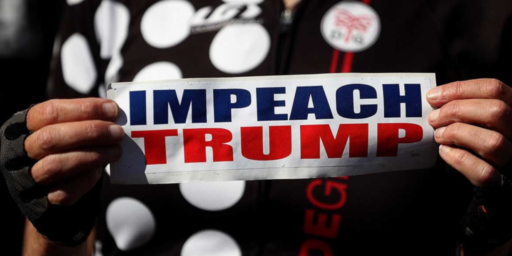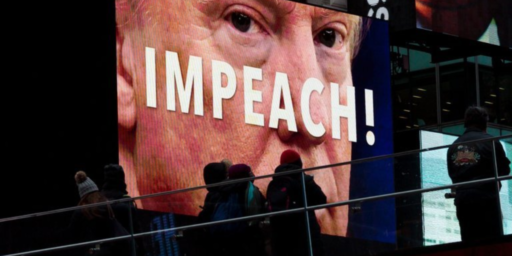House Backs Rules For Impeachment Inquiry
Today the House of Representatives approved the procedures for the impeachment proceeding against the President.

The House of Representatives, on what was basically a party-line vote, approved a resolution setting down the rules for the process that will most likely lead to the impeachment of the President of the United States for only the third time in third time in American history:
A divided House approved a resolution Thursday formally authorizing and articulating guidelines for the next phase of its impeachment inquiry, a move that signaled Democrats are on course to bring charges against President Trump later this year.
The 232-196 vote, which hewed closely to party lines, was expected to fuel the partisan fighting that has accompanied every stage of the impeachment probe and much of the Trump presidency. Nearly all Democrats backed the resolution, and House Republicans, who spent weeks clamoring for such a vote, opposed it.
At issue is whether Trump abused the power of his office to pressure a foreign leader to investigate his domestic political rivals.
In remarks before the vote, House Speaker Nancy Pelosi (D-Calif.) described the impeachment inquiry as a “solemn” and “prayerful” process — “not cause for any glee or comfort.”
At the same time, Pelosi said, “I don’t know why Republicans are afraid of the truth.”
“Every member should support the American people hearing the facts for themselves,” she said in a floor speech. “That is what this vote is about. It’s about the truth. And what is at stake in all of this is nothing less than our democracy.”
The White House blasted Democrats’ “unhinged obsession with this illegitimate impeachment proceeding” in a statement following the vote.
“The Democrats are choosing every day to waste time on a sham impeachment — a blatantly partisan attempt to destroy the President,” press secretary Stephanie Grisham stated.
Trump, who had no public events on his daily schedule, tweeted: “The Greatest Witch Hunt In American History!”
House Republicans echoed the White House in their criticism, describing the inquiry as an effort aimed at removing Trump from office.
“Democrats are trying to impeach the President because they are scared they can’t defeat him at the ballot box,” House Minority Leader Kevin McCarthy (R-Calif.) said on the floor before the vote, calling the opposing party’s approach a “disaster for democracy.”
“To my colleagues on the other side, I say this: Give the people back their power. Let them choose the next leader of the free world. Follow the principles of our Constitution. And do not dilute our democracy by interfering in elections from Washington,” McCarthy said.
The House’s resolution clears the way for nationally televised hearings as Democrats look to make their case to the American people that Trump should be impeached.
(…)
The House’s resolution allows the president and his counsel to request and query witnesses and participate in impeachment proceedings once they reach the Judiciary Committee, which is tasked with writing any articles of impeachment that will be voted on by the House. It also authorizes the House Intelligence Committee to release transcripts of its closed-door depositions to the public, and it directs the committee to write and then release a report on that investigation in the same fashion.
The resolution gives the Republican minority on both the Intelligence and Judiciary committees a chance to subpoena documents and testimony — provided that either the Democratic chairman or a majority of the committee agrees. And it establishes special procedures under which the chairman and top Republican on the panel can take up to 90 minutes to make their cases or defer to a staff lawyer to do so.
The resolution itself, which is embedded below, was unveiled yesterday and sets forth the procedures for what will be the first televised impeachment proceedings since the Clinton Administration:
House Democrats unveiled new procedures for the impeachment inquiry of President Trump on Tuesday, responding to Republican demands for due process by setting out rules for future public hearings delving into whether Trump should be removed from office.
The resolution backed by House Speaker Nancy Pelosi (D-Calif.) hands the lead role to the House Intelligence Committee and its chairman, Rep. Adam B. Schiff (D-Calif.), who would have broad latitude to organize extended questioning of potential public witnesses. Two other committees that have so far participated in the closed-door investigation into Trump’s dealings with Ukraine — Foreign Affairs and Oversight and Reform — would not be permitted to directly participate in the open proceedings under the legislation.
It also sets out for the first time the ability of House Republicans to make their own requests for testimony and documents, though those requests will be subject to a vote of the Democratic-majority committee — a practice that matches the minority powers in the 1998 impeachment of President Bill Clinton.
(…)
By confining the public hearings to the Intelligence Committee and excluding the other two panels that have participated in the closed-door interviews, Democrats are in effect sidelining several of the GOP’s most aggressive and outspoken defenders of Trump. They include Reps. Jim Jordan (Ohio) and Mark Meadows (N.C.), who serve on the Oversight panel, as well as Rep. Lee Zeldin (N.Y.) of the Foreign Affairs Committee, who have led the public pushback to the Democratic impeachment effort in the House.
Jordan said Tuesday that Democrats were “trying to put a ribbon on an already terrible process.”
“It’s complete garbage,” he said. “They can’t undo what they’ve done thus far. All the abuse of due process, all of the unfairness — they can try to dress it up, have a fancy resolution on the floor. But it does nothing. It’s still a sham process.”
(…)
Besides setting out procedures for public hearings in the Intelligence Committee, the resolution would also authorize that panel and four other committees investigating Trump to publicly release interview transcripts and transfer their investigative materials to the House Judiciary Committee, which is expected to draft articles of impeachment based on the other panels’ findings.
The Judiciary Committee would also have the power to hold public hearings under similar procedures to those given to the Intelligence Committee.
Under the resolution, both panels could engage in extended questioning of witnesses in rounds of up to 45 minutes, alternating between the two parties, before beginning the traditional five-minute rounds extended to panel members under existing rules. Both lawmakers and staff would be authorized to question witnesses.
Republicans have raised questions about Trump’s right to be personally represented by attorneys during the impeachment proceedings, noting that Clinton had lawyers present during the House’s consideration of articles in 1998. Responding to those concerns, the Judiciary Committee on Tuesday issued a three-page summary of procedural safeguards for the president.
They include the right of the president or his counsel to recommend additional testimony or evidence for the committee’s review, to attend all hearings and question any witnesses who testify, and generally to respond to the allegations against him “orally or in writing as shall be determined by the chair.”
But Democrats included a significant caveat: Should Trump “unlawfully refuse” to comply with subpoenas issued by the investigating committees, Judiciary Committee Chairman Jerrold Nadler (D-N.Y.) would “have the discretion to impose appropriate remedies” — including the denial of Trump’s requests to call or question witnesses.
The substance of the rules is actually quite interesting, and more deferential to the President and the Republicans than we’ve seen in previous impeachment proceedings. While I may be mistaken, I don’t recall the President and his attorneys had the right to participate that they are being given in these proceedings. Nor do I recall the opposition the right to call their own witnesses and subpoena documents. Additionally, I am too young to remember but I don’t recall the procedures duing the Watergate proceedings to be this generous to the President. This is why the complaints of Republicans about “due process” are so disingenuous. Arguably, they are being given greater rights to participate in the proceedings than House rules and precedent allow. While that may slow down the process to some degree, it does undercut Republican objections, which are without merit, that the President is somehow being treated unfairly.
Under the rules established by this resolution, the House Intelligence Committee will take point on the investigation and will be the first body to conduct public hearings. Those hearings will most likely begin in mid-November after the upcoming week-long House recess that starts tomorrow and last until after Veterans Day. After these hearings, the Intelligence Committee would then prepare a report that would be sent to the Judiciary Committee and to the full House, which will decide if it is appropriate to draft Articles of Impeachment based on that report. There may be additional hearings before the Judiciary Committee before a final vote, but if it decides to go through with Articles of Impeachment then it will be responsible for setting down those Articles and recommending them to the full House. The House will then vote on the Articles of Impeachment and, if approved, the matter would move to the Senate for a trial.
Based on the realities of timing alone, I expect that it will not be until shortly before the Christmas break that the House will vote on impeachment itself. A vote before Thanksgiving under these rules is not likely at all no matter how fast the House moves and even if the relevant Committees were to stay in session during the upcoming recess. This means that the earliest we would see a Senate trial would be January, which will likely pose some timing issues for sitting Senators who are running for President such as Warren, Sanders, Harris, Klobuchar, and Booker. Indeed, Senate Majority Leader Mitch McConnell could use his control of the calendar to make things difficult for these candidates, who will have to deal with a Senate trial that will keep them in Washington on the eve of voting in the February primary and caucus states.
The stage is set, let the games begin.
Here’s the resolution:
House Impeachment Resolution by Doug Mataconis on Scribd




I’m going with the narrative that Trump was impeached today.
I’m going with the narrative that Trump will be removed from office in the Senate trial tomorrow. That the SDNY indicts him on Monday and he is convicted and sentenced by Wednesday and that he is in the slammer by Thursday.
Who said the wheels of justice turn slowly?
@Paul L.: Yeah, well, you’re not doing your screaming thing in ALL CAPS, so I guess you might’ve figured out it was actually serious business? But you’re still willing to carry water and flags?
@Mister Bluster:
Go with the narrative that old man Mueller found proof of collusion and treason. Trump and Pence were charged and removed from office.
Nancy Pelosi is now President.
Whatever floats your boat Captain Queeg…